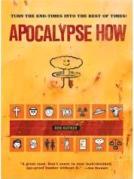One of the nice things about the Writers Guild strike (...okay, the only thing nice) is that it allowed members to meet their fellow-writers in daily protest.
One such person I crossed paths with (though via email) was Rob Kutner, an Emmy-winning writer for The Daily Show with Jon Stewart. Eventually, we met in person after he was dragged from New York to help write the monologue when his mouthpiece hosted the Oscars. It was a pleasure to discover that he didn't just spend the meal making fun of politics, but was a genial, good-natured soul, as well.
Once he got back and The Daily Show was again on the air, I was happily able to start emailing him regularly about how good a sketch was and having him reply, regularly, "Thanks. But I didn't write that."
What he did write, however, is a hilarious new book, Apocalypse How -- a guide to surviving the coming Apocalypse, however it turns out to be caused. It covers all the bases, which is what any good guidebook should do, and gives all manner of advice, quizzes, charts ("Stuff or Crap? A Scientific Approach"), to-do lists and even games to prepare for every possible end-of-the-world scenario. The lesson of the book is simple, to show the positive side of post-devastation. "The world coming to an end isn't the end of the world."
You learn the answers to such (literally) burning questions as "Should I stay or should I flee?" And "Will people date you if you really are the last man on Earth?" Indeed, as Kutner notes, "No longer will just a good man be hard to find -- any man will be." Therefore, every social encounter has to count, though most will be impacted by fighting off looters, escaping from aliens, or trying to avoid the of domination of mutated monsters.
Kutner runs through all the scenarios which could lead to the Apocalypse. These range from nuclear bomb (improbable), rise of the Machines (possible), mad genius evil scheme, alien invasion, ecological disaster (the planet will have "all the ambience of the Middle East, but none of the oil"), or the Christians are right.
To be fair, Kutner also runs through the doomsday prophecies of most other religions, but tends to dismiss them. Judaism's belief is "not so much an eternity in Hell as an eternal sense of guilt." Zoroastrianism predicts a devouring fire and then forgiveness after 72 hours, but that's nothing because "we've had hangovers that lasted longer." As for Mormonism, he isn't quite sure what their theory is because "we were too busy slamming the door into the face of the guy telling us about it."
Impressively, what could be a depressing subject to some, the book is actually uplifting and gives hope. As he puts it:
Ever dreamed about being #1 in the world at something? Downhill skiing, chess, World's Best Grandma, Best Supporting Actor in a Prime-Time Comedy Series? Good news, friend: The herd has been thinned. This is your moment to shine.
Of course, you'll have to survive first, but that's where this guide becomes invaluable.
Food, for instance, will be the greatest challenge, but Kutner provides numerous post-Apocalyptic recipes. My favorites were Tumbleweed Surprise (which includes the ingredient, "1 Can Campbell's Cream of Mushroom soup, looted"), Moo Shu Varmint ("Yes, we realize such things are tough to come by, but honestly - it's just not Moo Shu without the hoisin"), and Stone Soup (ingredients - 1 Fresh Stone).
Having food is one thing, keeping it safe is another, which is why protecting your possessions is a running theme of the book -- like, inventive ways for creating mass panic to disperse hovering hordes. For that matter, running is a running theme, as well. Kutner offers wise guidance here:
"It's going to take a while to get away from wherever you're fleeing," he acknowledges, so on those long -- very, very long -- road trips you and your family will be taking, avoiding the alien mothership perhaps, he provides numerous, fun family games to play. The games include "I Spy" - a childhood favorite with a post-cataclysm twist ("I spy something GREEN.") "Former State Capitols." And "Armageddonopoly."
This is not all future assistance. Kutner ends each chapter with "Before We Blow" to-do suggestions on how, right now, you can increase your chances to survive. "Create a Family Emergency Plan," is one such list. "Designate a family landmark or structures to meet at. (Ex. 'the smoking ruins of the library,' 'the hole where our house used to be.')
The guide includes critically-important sections like - "What to Expect When We're Exploding," how to fend of zombies, and foraging for non-radioactive food.
But what of that "If you were the last man on Earth" question?. As Kutner notes, in a post-Apocalyptic world the question isn't finding one's soul mate, but "sole mate." With so few choices, the good news is that odds are in your favor. Nice eyes will be less important than character traits like "I have a box of matches."
In the end (and I mean "the end"), "Apocalypse How" will be a book you read over and over and over. This won't necessarily be because it's so good, but after the Apocalypse it might be the only book still around. But happily it is so good. I may be biased, but that doesn't mean I'm wrong.
Moreover, in an emergency, as Kutner mentions, the book can be used for kindling.

Apocalypse How: Turn the End Times into the Best of Times by Rob Kutner is from Running Press, and available on Amazon.com. And probably elsewhere.